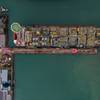Shippers Need Practical Steps to Achieve Cyber Security
GTMaritime, provider of shipboard software solutions, says too many shipping companies have yet to take basic precautions for cyber security onboard ship.
While cyber security has become a hot topic on conference platforms and industry events around the world, implementation plans and training for crew are lagging as companies take time to develop top-down strategies.
While shipping companies get to grips with the longer term issues of securing supply chains and remote monitoring systems, there is an immediate need for better shipboard practices, says GTMaritime Managing Director Rob Kenworthy.
“At home or in the office, we would not question whether we needed an anti-virus solution, so why should it be any different on-board? A vessel’s computer systems are vulnerable, just like any others. Our email service already scans all email to ensure no viruses are sent to the vessel, but on-board protection is still required against malware from USB memory drives and the Internet.”
Vessel crews have been identified as a ‘front line’ in the fight against hackers, with dire predictions of potential targeting of vessels at sea and in port. However, when asked how many of their crew have received training on cyber security or the safe use of social media, not enough owners have addressed the basics of improving procedures onboard.
To help owners take their first step towards a shipboard cyber strategy, GTMaritime has partnered with one of the world’s leading security solution providers, ESET, to develop GTSentinel, an anti-virus solution optimised for the maritime market, designed to minimise the impact of low bandwidth networks.
Rob Kenworthy adds, “In addition to firewall and anti-virus functions, GTSentinel can help protect vessels against malware and automated diallers, offering real-time protection and system monitoring as well as scheduled scans. Updates are designed for efficiency so are perfect for a low bandwidth or other well-managed connection and utilise local networking on-board. The software can be installed, configured, managed and monitored remotely from shore.”
NGOs and regulators are increasingly paying attention to the subject. The U.S. Coast Guard’s cyber strategy, published in June 2015 makes threat response an integral part of a ship operator’s responsibilities. The International Maritime Organization approved its own interim guidelines at the recent Maritime Safety Committee meeting.
The industry’s first cyber guidelines were launched earlier this year by BIMCO, CLIA, ICS, INTERCARGO and INTERTANKO and Greek IT managers association AMMITEC recently published its own similar guide for owners, operators and managers.










